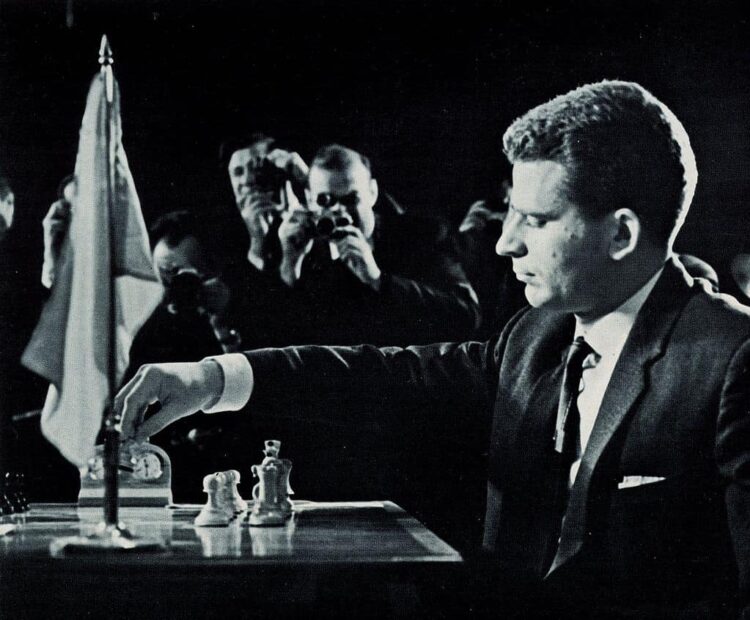Boris Spassky, a name synonymous with chess greatness, is a Russian grandmaster who reached the pinnacle of the chess world during the 1960s and 1970s. Known for his elegant and versatile style, Spassky earned the World Chess Championship title in 1969 and held it until 1972. His most famous match was the 1972 World Chess Championship against American prodigy Bobby Fischer, which turned into a Cold War symbol and garnered global attention. This article delves into Spassky’s life, career, and contributions to the chess world.
Last Updated:
Full name: Boris Vasilievich Spassky
Title: International Master (1953), Grandmaster (1955)
Born: January 30, 1937
Place of birth: Saint Petersburg, Russia (formerly known as Leningrad, USSR)
Ratings
World Ranking: 522
Classical: 2548
Profiles
Biography
Boris Vasilievich Spassky is a Chess Grandmaster hailing from Saint Petersburg, Russia (formerly known as Leningrad, USSR). Boris is best known for becoming the youngest chess player at the time to earn the Grandmaster title in 1955 after winning the World Junior Championship then.
In 1969, Boris emerged victorious from a match with Tigran Petrosian and became the tenth World Chess Champion. He held onto this title for three years before losing to Bobby Fischer in the widely popular 1972 game. But despite his loss to Fischer then, this match established his international fame.
Boris is famous for having a universal chess play style, a perk that made him become a versatile player in the game. This distinct play style of his also helped him defeat multiple Chess grandmasters during his several Chess matches.
Prior to his chess career, Boris had a rough childhood as he suffered through the Siege of Leningrad during the Second World War. After his hometown became under the control of the Army Group North of Nazi Germany, Boris, along with his older brother Georgy, had to evacuate to an orphanage located in the village of Korshik.
Fortunately, despite almost dying from hunger, Boris’ parents managed to reunite with him and his brother at the orphanage before it was too late. After reuniting with their parents in the said orphanage they evacuated in, Boris and his older brother moved to the Moscow region, where they remained until the summer of 1946. In the same year, Boris’ family came back to Leningrad, where he “found himself at the mercy of chess” the following months after his return to his hometown.
Early Life and Career
Boris Vasilievich Spassky was born on January 30, 1937, in Leningrad (now St. Petersburg), Russia. He began playing chess at the age of five and quickly demonstrated his natural talent for the game. At the age of ten, he started studying at the prestigious Leningrad Pioneer Palace, where he was trained by Russian chess master Vladimir Zak. Spassky’s potential was evident from the beginning, as he went on to win the USSR Junior Chess Championship in 1952.
Boris recalls in an interview that he first started learning the Chess moves while riding a train on the way to the village of Korshik as he evacuated from Leningrad. He was only five years old at the time. He also mentions picking up the game’s rules by watching the elders play rounds of Chess at the orphanage he stayed in. In fact, one night, when nobody else was present, Boris played his own round of chess by removing the last pawn and wiping the entire white army with a single rook.
And at just ten years old, Boris immediately had a grand entrance into the Russian Chess world. After all, he claimed victory in a match with Soviet champion Mikhail Botvinnik at a simultaneous exhibition held in 1947. Ever since he began his chess career at ten years old, Boris has frequently trained daily with master-level coaches for multiple hours.
His training proved to be fruitful, as he’s garnered multiple Chess achievements at just a young age. Due to his exemplary skills, he was even commended by Botvinnik.
Breaking Into the International Chess Scene
Spassky’s rise to prominence began in 1955 when he became an International Master at the age of 18. The following year, he won the World Junior Chess Championship and earned the Grandmaster title, making him the youngest grandmaster at the time. In 1956, Spassky also participated in his first USSR Chess Championship, finishing third.
Throughout the late 1950s and 1960s, Spassky continued to improve his game, winning the USSR Chess Championship twice (1961 and 1973) and competing in several Candidates Tournaments. His style was marked by a rare versatility, as he excelled in all aspects of the game – openings, middle game, and endgame. This allowed him to adapt to different opponents and situations, making him a formidable competitor.
Achievements
Boris’ skill in Chess clearly manifested during his young years. After all, he became the youngest Chess player from the Soviet region to reach the following milestones in his chess career: first category rank at ten years old, candidate master rank at eleven years old, and Soviet Master rank at fifteen years old.
When Boris was sixteen years old, he also shook the global Chess scene during his international debut in 1953, after tying with Laszlo Szabo on 12/19 in a chess game held in Bucharest, Romania. It was also during this year that Boris earned his International Master title awarded by FIDE. For more information on ratings, see the step-by-step guide on how to get a FIDE rating.
And by 1955, at age eighteen, Boris won the World Junior Championship that took place in Antwerp, Belgium. He scored a 6/7, allowing him to reach the finals. During the finals, he scored an 8/9, putting him one complete point ahead of Edmar Mednis.
Moreover, since Boris’ performance at the said match met the qualifications for the 1956 Candidates’ Tournament, he ended up securing the Chess Grandmaster by then. At the time, he became the youngest Chess player to earn the Grandmaster title.
In addition, Boris is also known for beating six undefeated World Champions more than two times. These chess players included the likes of Vasily Smyslov, Tigran Petrosian, Mikhail Tal, Anatoly Karpov, Bobby Fischer, and Garry Kasparov.
World Chess Champion
Spassky’s crowning achievement came in 1969 when he faced Tigran Petrosian, the reigning World Chess Champion, in a match for the title. Spassky won the 24-game match with a score of 12.5-10.5, becoming the tenth World Chess Champion.
The Match of the Century: Spassky vs. Fischer
In 1972, Spassky faced American chess prodigy Bobby Fischer in the World Chess Championship match, held in Reykjavik, Iceland. The match, which was widely dubbed as the “Match of the Century,” became a symbol of the Cold War rivalry between the United States and the Soviet Union. The event garnered unprecedented media attention, elevating the profile of chess globally.
The match started with controversy, as Fischer forfeited the second game due to a dispute over playing conditions. However, Fischer went on to win the match with a score of 12.5-8.5, ending the Soviet dominance in world chess since 1948. Although Spassky lost his title, his sportsmanship and gentlemanly conduct during the match earned him admiration worldwide.
Later Career and Legacy
Following his loss to Fischer, Spassky continued to play competitive chess. He emigrated to France in 1976 and gained French citizenship in 1978. He represented his adopted country in several Chess Olympiads and remained an active grandmaster until the 1990s.
Spassky’s contributions to chess are immense. He not only held the World Chess Championship title for three years but also left an indelible mark on the game with his diverse and adaptable style. His match against Fischer brought chess to the forefront of global consciousness, inspiring countless players and popularizing the game in the West.
In addition to his on-board accomplishments, Spassky’s role as a chess diplomat cannot be overlooked. His sportsmanship and demeanor in the face of adversity during the 1972 World Chess Championship match set an example for future generations of chess players. Despite the politically charged environment surrounding the match, he remained focused on the game itself and respected his opponent.
Spassky’s approach to chess was characterized by a deep understanding of the game’s fundamentals and an appreciation for the art of the sport. He was known for his ability to adapt to any style of play, making him one of the most versatile chess players in history. His technique and innovative ideas have had a lasting impact on the development of chess strategy and continue to inspire players of all levels today.
Retirement and Personal Life
Boris Spassky retired from professional chess in the early 1990s but remained an active participant in the chess community. He coached young players, gave lectures, and took part in various chess-related events. Spassky married twice, first to Larisa Soloviova, a Russian woman, and later to Marina Stcherbatcheff, a French-Russian woman. He has two sons from his first marriage.
In 2012, Spassky suffered a stroke, which led to a period of health challenges. Despite these difficulties, his passion for chess remained undimmed, and he continued to be involved in the chess world.
Conclusion
Boris Spassky is a true legend of the chess world. His achievements, including winning the World Chess Championship and participating in the historic “Match of the Century,” have left an indelible mark on the history of the game. His elegant and adaptable playing style, sportsmanship, and dedication to the sport have inspired generations of chess players and enthusiasts. As a grandmaster, diplomat, and chess ambassador, Boris Spassky’s legacy will forever be remembered and celebrated in the annals of chess history.


